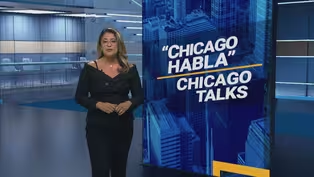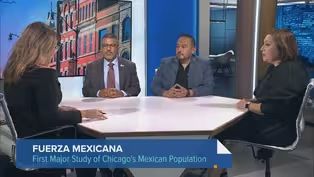Chicago Tonight: Latino Voices
Is Migrant Crime Actually on the Rise? What Data Shows
Clip: 9/19/2024 | 8m 56sVideo has Closed Captions
Claims of an immigrant crime wave have been a major talking point this election cycle.
Immigrants are far less likely to commit crimes than U.S.-born residents, according to recent data published in the National Bureau of Economic Research.
Problems playing video? | Closed Captioning Feedback
Problems playing video? | Closed Captioning Feedback
Chicago Tonight: Latino Voices is a local public television program presented by WTTW
Chicago Tonight: Latino Voices
Is Migrant Crime Actually on the Rise? What Data Shows
Clip: 9/19/2024 | 8m 56sVideo has Closed Captions
Immigrants are far less likely to commit crimes than U.S.-born residents, according to recent data published in the National Bureau of Economic Research.
Problems playing video? | Closed Captioning Feedback
How to Watch Chicago Tonight: Latino Voices
Chicago Tonight: Latino Voices is available to stream on pbs.org and the free PBS App, available on iPhone, Apple TV, Android TV, Android smartphones, Amazon Fire TV, Amazon Fire Tablet, Roku, Samsung Smart TV, and Vizio.
Providing Support for PBS.org
Learn Moreabout PBS online sponsorship>> Claims of an immigrant crime wave has been a major talking point.
This election cycle.
However, immigrants are far less likely to commit crimes in U.S. Foreign resident.
That's according to recent data published in the National Bureau of Economic Research.
But presidential candidate Donald Trump has doubled down on the rhetoric calling for a mass deportation.
>> I can say this.
We will do large deportations from Springfield, Ohio, large deportations were going to get these people out would bring back to Venezuela.
You know, he told Biden he's not accepting anybody back.
They moved or they're criminals.
Not all of them.
But the rest of moving in now the empty jails in Venezuela empty.
They're criminals empty.
The nest.
>> Joining us now to explain more our University of Illinois-Chicago history professor lead the effort on Sylvia DIA's director of mental health services at Area Neighborhood House and via Zoom.
We have University of California Davis, economics professor and the study's coauthor, Gulf that is.
Thank you all for joining us today.
Some I want to start with you.
Your study found that over 150 year period, immigrants have never been incarcerated at a greater rate than those born in the United States.
What does this tell us about the connection between immigrants in crime rates?
>> Thank you so much for being patient yet.
So that's that's part of the the or And then we have 3 communities and yeah, that's it.
That's it.
What we find we're finding that Florida come in years meet I mean, you know, where to cut the nation's great be with more.
Shifting that, you know, speed he was called big.
There's not much of a connection between if you need a truck crime.
>> so immigrants are contributing to violent crimes in high numbers in violent crimes have been steadily decreasing for the last 3 decades.
But it seems like we're always hearing about immigrant crime.
Some reports are saying Venezuela migrants are taking over Aurora, Colorado and Haitians are eating cats and dogs in Springfield, Ohio, just to name a couple of things.
How did immigrants, particularly immigrants from global South, gets tear types as criminals and violent?
Well, they're not the first to be stereotyped in these ways.
And this narrative that immigrants are criminals.
>> Is a very old and tired textbook marketing technique.
And if you look at the 1700's, the Germans were aligned and the 1800's, the Irish later and the late 19th and early 20th century, Italians, Russian Jews poles, other southern Eastern European groups.
So this is a technique that political candidates in particular like to use to stir up anger, to stir up fear to get people to out them up and get them out to vote.
But the reality is that, you know, it's not the case.
You know, the few crimes that immigrants, my commit might get some station allies or exaggerated, blown out of proportion.
And then really, you know, make the headlines and cover or on the news.
>> And Sylvia, when you go to you should call, Chicago has welcomed over 40,000 migrants in the last 2 years.
You work with new arrivals looking.
You tell us about people's experiences arriving here at the shelters at this moment.
So it's very unfortunate to hear people cast judgment on them, right?
Especially if we're thinking about their contacts of exit a lot of these individuals not choose to leave their home, right.
They did not choose to come to a country that.
>> It's predominantly English, right where they did not choose to go through a whole migration journey where a lot of these individuals have disclose that they slept in the Amazon.
They have to go on by foot.
A lot of the path crossed through countries where they were also discriminated against.
Right?
Because unfortunately us as letting all sometimes we do discriminate against each other.
Right in a lot of have shared with me experiencing abuse in borders, various borders, right?
And up to when they get here.
Right.
A lot of them have arrived in the cold with no experience, right?
I had a mom had hypothermia because she arrived December, had no jacket, nothing to keep her warm and then ended up being hospitalized in the people that you're working with.
Are they aware of these narratives are being told about them?
>> I'm sorry.
What do mean like the narratives of?
I just talked about that.
They're stereotyping them as criminals.
You know, I think when they experience out in public, they are aware.
But when they first arrived, they don't realize it right there.
Just hear their focus is her family.
A lot of these individuals are just focused on feeding your kids, making sure they're safe.
>> Some of them are running away from from violence as well.
Right?
We have a lot of past army officials, right that are also being persecuted over there.
>> In Diego, part of your study says that immigrants today are doing better than previous generations, particularly when it comes to the rates in which they're incarcerated.
We do.
You think happened?
>> Are you happy that have to as we right, confined a I you know, you could simply not I don't need a shrink.
Always thought of targeting Ward fan.
You know, we actually find rematch the local state.
So we find that if you will bear, they're going great for conservation of in bathroom.
You know, you know, them, even if I did with debate.
So we can that number to put nation of would be.
So, you know, he how that and people we spoke ABC networking.
one thing that we do committing did and front road that Norman and where if you look at how we need who they are and who we people but I too.
Next with warning you of the better.
I don't But I do think doing, you know how it got to labor market.
I mean it they are for me.
So be seen to be part really fundamental 50 feet crime and and you know that will be laid Reno for FIFA, just going to say shun of nation that Even at of the nation more than they need a public >> And then if you believe the reports like this are important to debunk these narratives, oh, absolutely.
I think that there's a lot of work to be done re-educate the public and give them actual facts and data.
>> You know that the rhetoric that we're hearing from political candidates like the former president suggest that we are being overrun with immigrants that country is being invaded.
And if you look at the numbers actually, just as a point of comparison in 18, 80 cities like Chicago, New York, San Francisco.
We're between 40 to 45% immigrant.
If you add their children, they were up to 80% of the population were nowhere near that today.
And so I think that people really need to inform themselves and educate themselves about the facts, not just the hysteria and the rhetoric that circulating.
And Sylvia, what else needs to be done to better integrate asylum seekers into our communities?
He would say, I would say making sure their basic needs are met.
>> making sure they have housing that proper nutrition that's very important.
And I've had families that are living in hotel rooms living off of model time, right?
That's not proper nutrition for them.
And also support services like case management, mental health.
Right?
Because a lot of people are coming with traumatic experience.
A longer journey and do the same question.
Asker do believe are studies like this are important.
Absolutely.
As media said, it important for everyone to be informed and gold off of facts right at this point.
Many asylum seekers have been here for 2 years.
What do you want people to know about them?
I want them to know that their human right and I would love for people to put themselves in their position.
Right.
And think of yourself as a mother as a father.
Well, would you do if you know, because they have here, people make comments of all, why would they make their children go through that experience, right.
But when you're coming from a place, all right.
Again, thinking about the context of exit when you're coming from place where your children are watching teary deteriorate or you're waiting for someone to come and shoot.
You.
You're going to do whatever you need to make sure they're safe and healthy.
And then we only have a couple seconds.
But we talked and we've heard Trump talk about he if he is president, he is going to conduct the largest deportation history.
>> Quickly, can you talk about how the threat of deportation has been used in our country's history?
It's been used repeatedly throughout the 20th century, really.
And even before that.
>> And it's often and times of economic downturns, its
Chicago Talks: What Latino Person Has Inspired You?
Video has Closed Captions
Clip: 9/19/2024 | 2m 30s | Chicagoans are celebrating Hispanic Heritage Month. (2m 30s)
New Report Highlights History, Challenges for Mexicans in Chicago
Video has Closed Captions
Clip: 9/19/2024 | 8m 10s | One in five Chicagoans are considered Mexican. (8m 10s)
Providing Support for PBS.org
Learn Moreabout PBS online sponsorship
- News and Public Affairs

Top journalists deliver compelling original analysis of the hour's headlines.

- News and Public Affairs

FRONTLINE is investigative journalism that questions, explains and changes our world.












Support for PBS provided by:
Chicago Tonight: Latino Voices is a local public television program presented by WTTW

